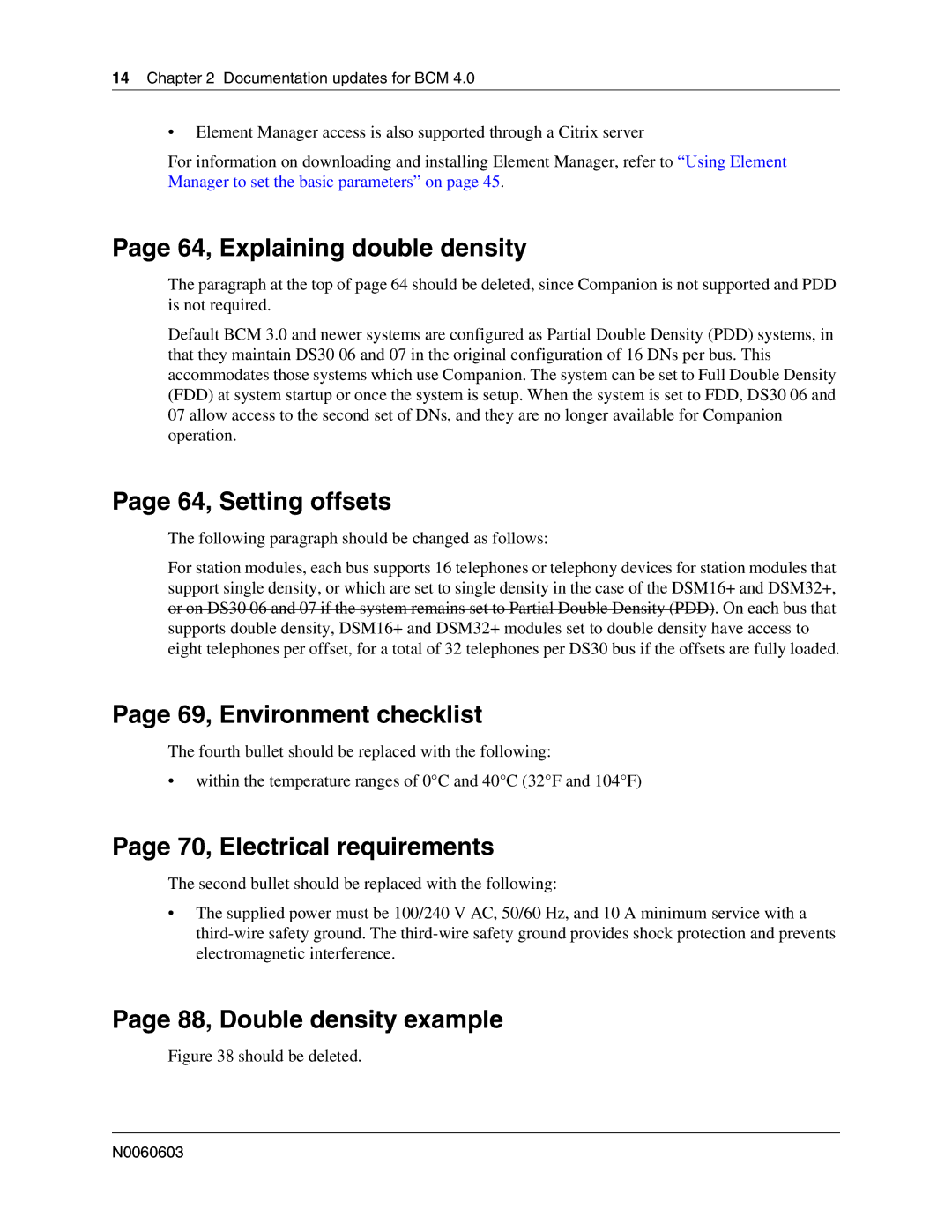BCM
Copyright 2006 Nortel Networks, All Rights Reserved
Software License
N0060603
Contents
Appendix C Configuring the BCM system
Appendix F Completing the initial installation optional
Contents N0060603
About this document
How to use this addendum
Chapter
What’s new in BCM
About this document
3, Preface
Documentation updates for BCM
General changes
22, Data networking components
44, Analog station modules and analog devices
Documentation updates for BCM
33, , Telephony hardware
52, Legacy mobility equipment
55, , Auxiliary equipment
64, Explaining double density
64, Setting offsets
69, Environment checklist
70, Electrical requirements
Performing a system shutdown
Documentation updates for BCM 4.0
110, Shutting down the system
To shut down the system software
Pages 144-146, Telephone port and DN cross-reference
Pages 126-131, Setting initial system configurations
Pages 131, Entering the software keycodes
To shutdown the system hardware
Pages 160-161, New chapters
171, Software restart
196, Controlling and monitoring mirroring operations
To initialize the hard disk in a single disk configuration
182, Initializing the hard disk single-disk system BCM
Initializing the hard disk
Disk mirroring settings
Tab Field Functions Description
230, Moving telephones
233, Appendix A, Defining region-based defaults
229, Determining the status of a telephone
254, Set DNs and port numbers
About this guide
Appendix a
Getting started
Audience
Appendix a Getting started Acronyms Sheet 2
Acronym Description
Symbols and conventions used in this guide
Appendix a Getting started Acronyms Sheet 3
Appendix a Getting started
Convention Example Used for
Related publications
Technical Documents
How to get help
Call Pilot
Getting Help through a Nortel distributor or reseller
Appendix a Getting started N0060603
Initializing the system
Using the default BCM system IP address
Appendix B
Data parameter requirements
Connecting through Ethernet crossover cable
Using the Ethernet crossover cable
Setting the crossover connections
To connect the Ethernet crossover cable
Connecting through the serial port
To configure your computer
Pin Signal
Null modem cable setup
To display the configuration menus
Serial port pinout
Configuration main menu screen appears. Refer to Figure
Next step
Regenerating a keycode after system replacement
Software keycode
Appendix C
Configuring the BCM system
Appendix C Configuring the BCM system
Initial parameters overview
Initial parameters
Startup parameters overview
Startup parameters
Appendix C Configuring the BCM system N0060603
Using Telset Administration to set the basic parameters
Appendix D
To enter the keycodes
Configuring the initial parameters
To configure the IP address
To configure the modem
To select the region
To create Telset user accounts
To select the telephony startup template and start DN
To initialize voice mail
Next step
Page
Using Element Manager to set the basic parameters
Appendix E
To download and install Element Manager
Accessing the BCM system
To access the BCM web
Prerequisites
To connect to the BCM system
To enter a keycode
Attribute Description
To configure the LAN IP address
Modify IP Settings attributes
Quick Install Wizard attributes
To configure the startup template for telephony services
Cold Reset Telephony attributes
To enter a name for your system
Configuring the startup parameters
To configure the date and time settings
Date and Time attributes
To configure Dhcp server settings
Subnets General Settings attributes Sheet 1
To configure IP Phones
Dhcp server IP Terminal Dhcp Options attributes
To configure Snmp settings
IP Terminal Global Settings attributes
Modify Snmp Settings attributes
To configure Snmp community strings
To configure the Snmp manager list
Add Community String attributes
To create user accounts
Add Account attributes
Page
Appendix F
Completing the initial installation optional
Appendix F Completing the initial installation optional
Configuring the media bay module
To configure the MBM
Configuring voice mail
Configuring modem settings
Checking for software updates
Performing a backup
Appendix F Completing the initial installation optional
Media bay module availability
Appendix G
Market profile attributes
Media bay module availability by market profile Sheet 1
Canada Caribbean Denmark
FEM MBM-Norstar trunk cartridge combinations
Analog trunk card
Time zones and language information
Time and date format based on language
Time/date formats based on language
Language support for South America and Central America
Appendix G Market profile attributes
South/Central America language support
Market profile Functionality Attribute Australia Brazil
Core parameters for market profiles
Caller ID display formats
N0060603
Cala
Vicap
PBX
N0060603
PRC
Mcdn 4ESS
PRC
Vicap
ITU-T
N0060603
Vicap
Global analog trunk parameters
Pulse Dialing ms
Transmission parameters
Stop Digit
On-hook caller ID Disconnect supervision Message waiting
Market Start Digit Line Voltage Stutter Profile
Busy tone Reversal
Input
GASM8 parameters
Transmission
Impedance Gain Scheme
EIA/TIA-464A
Dial pulse Min/max Min interdigit Coding Break
Dial pulse and Dtmf parameters
Dial pulse
Isdn services by protocol
Isdn line services
Isdn line services
Protocol Market profile Available Isdn services
Trunk types Description Digital trunk types
Analog and digital trunk types
Analog and digital trunk types and descriptions Sheet 1
Trunk types Description
Analog trunk types

